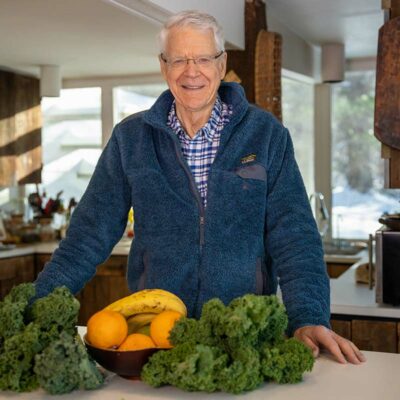Veganism In Older Age

A plant-based diet is a healthy choice for people of all ages, and offers many potential benefits to older people in particular. It can reduce the risks of heart disease, type 2 diabetes, and some cancers, all of which disproportionately affect older people.
The wide range of antioxidants in fruits and vegetables are anti-inflammatory and linked to better health, including an improvement in the symptoms of arthritis. Plus, a plant-based diet is rich in fiber, which supports good gut health, and we know how important that is for our overall health and well-being. Perhaps it comes as no surprise, then, that a 2021 study found that older adults who eat a vegan diet take 58 percent fewer medications than non-vegans.
While we can get all the nutrients we need on a vegan diet, there are a few things to be aware of as we age, when our eating patterns and behaviors are likely to change. One common change is that we tend to eat less, and research has found that, in people of all diets, this can lead to insufficient intakes of calcium, iron, zinc, B vitamins, and vitamin E. Even getting sufficient calories can be an issue, but none of this has to be a problem.



For older vegans, protein-dense foods made from seitan could be a good option. These are often made into convenient and tasty “snackable” foods, such as nuggets or popcorn “chicken”, which deliver high protein in a small portion size.
Our bones can become more fragile as we age, so a good source of calcium is important, especially as it is also needed for heart, nerve and blood health. Calcium-set tofu and non-dairy milks and yogurts are probably the best sources, but calcium can also be found in green leafy veg (kale has the most), dried fruit (especially figs), beans (especially soya), nuts and seeds (especially chia and sesame), and bread, which is often made with calcium-fortified flour. If the appetite dwindles, and getting 700mg daily of calcium is not possible, we would suggest older people take a calcium supplement.
As for B12, although there are plenty of ways to get this little vitamin in our food, we recommend a daily supplement for people of all ages, just to be safe.
To boost calories, we can add a little olive oil to our meals. We can stir a tablespoon of peanut butter into soups, stews or smoothies, and add soy cream to oatmeal. Avocado is a great sandwich filling for healthy fats and vitamin E.
While there are so many benefits to adopting a plant-based diet as we get older, and the longest-living populations on the planet do tend to eat this way, the biggest challenge may be breaking with long-held traditions and adopting new eating habits. There is no doubt that the food is nourishing and delicious, and we can get all the nutrients we need from it, and yet it can take time to transition. That’s OK! Some people find that replacing one animal product at a time can be beneficial, such as choosing a plant milk instead of dairy, or phasing out red meat in favor of meat-free alternatives. It doesn’t matter where you start, so just pick what works for you.
Recommended reading:
Ageless Vegan: The Secret to Living a Long and Healthy Plant-Based Life by Tracye McQuirter and Mary McQuirter